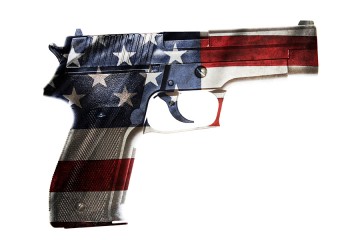Details continue to emerge about the abusive history of the gunman who shot and killed at least 26 churchgoers Sunday in Sutherland Springs, Texas, sparking an important conversation about the relationship between gun violence and domestic violence.
The Sutherland Springs shooter, Devin Patrick Kelley, was convicted of two counts of domestic abuse in 2012; documents released Monday state that he had repeatedly hit, kicked, and strangled his first wife, and had assaulted his stepson with enough force to fracture the child's skull. Kelley, who received a bad conduct discharge from the U.S. Air Force in 2014, also has a history of animal abuse and in 2014 was charged with animal cruelty in Colorado Springs.
A study conducted by the nonprofit, nonpartisan group Everytown for Gun Safety found that between 2009 and 2016, the majority of mass shootings in the U.S.—54 percent—had a connection to domestic abuse or family violence.
"Generally, it fits a pattern of easy access to firearms of individuals who have very controlling kind of relationships with their intimate partners, and are greatly threatened when their control is challenged," said Daniel Webster, director of the Johns Hopkins Center for Gun Policy and Research, in an interview with NPR.
Kelley had sent threatening messages to his mother-in-law and on Sunday traveled to the First Baptist Church, where his wife's family prayed, and opened fire, killing his wife's grandmother and 25 others.
"The gunman's history of domestic violence should have prevented him from purchasing a gun," said Jacquelyn Campbell, a professor in the Johns Hopkins School of Nursing's Department of Community-Public Health and an expert on intimate partner violence. "But there are too many ways—through online purchases, gun shows, and more—that guns can be purchased without background checks, or as a result of domestic violence convictions never being recorded."
It's this last oversight that allowed Kelley to purchase firearms. The Air Force has confirmed that his domestic violence conviction was not entered into the National Criminal Information Center database, meaning he would not have been flagged during a background check when purchasing a gun.
But there are other loopholes that allow domestic abusers to gain access to firearms, as Campbell explained in an interview with the Hub last year. For example, dating partners are not covered by federal prohibitions unless the partners are/were co-habitating as spouses or have a child in common—the so-called "boyfriend loophole."
"We need to enforce the gun laws we already have that keep guns out of the hands of known domestic violence offenders, and we need to explore more carefully the link between mass shootings and domestic violence," Campbell said. "These links have been noted in countless other cases, and there are too many loopholes still left in the system."
Posted in Voices+Opinion, Politics+Society
Tagged gun policy, gun control, domestic violence









